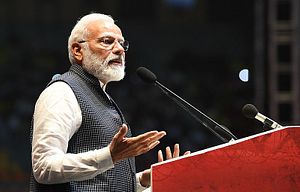Indian Prime Minister Narendra Modi was forced to cancel his visit to the country’s troubled northeast for the second time in less than two months owing to the raging agitation against the new citizenship law passed by Parliament last month.
Modi was supposed to inaugurate the youth games called Khelo India in Guwahati January 10, but it was cancelled two days ahead of the event. There was speculation among some official circles that the prime minister would turn up at the closing ceremony of the games but that did not happen.
Just a week ahead of the games, a cricket match between India and Sri Lanka had to be cancelled in the city due to rains but spectators from the gallery shouted slogans against Assam chief minister Sarbananda Sonowal and another senior minister Himanta Biswa Sarma who are staunch advocates of the Citizenship (Amendment) Act.
The Assam state cabinet convened a meeting on the next day to take stock of the situation which also decided to recommend cancellation of the prime minister’s visit.
An official claimed that repetition of the “rowdy behavior” by some spectators in the stadium would have been extremely embarrassing for the prime minister who has already drawn flak for the new citizenship law from several quarters.
In India’s northeast, which consists of eight states, the agitation against the Citizenship (Amendment) Act has been most vociferous in Assam. The other states have been exempted from the purview of the law either because they are under the Inner Line Permit regime or the Sixth Schedule Autonomous Councils.
Early last month, Modi’s summit with Japanese Prime Minister Shinzo Abe in Guwahati was also called off due to the protests. Civil society groups at the vanguard of the movement in Assam had warned that the event would be boycotted and protesters had pulled down hoardings erected in the city to welcome Abe.
“With reference to the proposed visit of Japanese PM Shinzo Abe to India, both sides have decided to defer the visit to a mutually convenient date in the near future,” spokesperson Raveesh Kumar from ministry of external affairs said in a tweet.
The duo were also scheduled to visit neighboring Manipur on December 17 to pay tribute to the Japanese soldiers killed during the Second World War and the Indian Peace Memorial at Maibam Lotpa China in Bishnupur.
Meanwhile, two important developments on the Citizenship (Amendment) Act was the Supreme Court judgment on a clutch of petitions challenging the law and the announcement by a senior BJP leader that the norms were being framed for inclusion of a section of non-Muslims as citizens.
The Supreme Court has refused to pass a stay order on the law without hearing the government which was asked to respond within four weeks. The apex court also indicated the setting up of a constitution bench to hear the matter and said it would hear the petitions pertaining to Assam and Tripura from the northeastern region separately.
Earlier, BJP leader Himanta Biswa Sarma who is also Assam’s finance minister told the media in New Delhi that people who have not applied for inclusion of their names in the recently concluded National Register of Citizens (NRC) would not be eligible for consideration of citizenship according to the rules and procedures being compiled by the central ministry of home affairs.
He explained that the government would independently make an assessment through its agencies to ascertain whether the person who has applied was a victim of religious persecution in the neighboring country. A person seeking citizenship under the new law may also be asked to provide other documents to prove his case.
Rajeev Bhattacharyya is a senior journalist in Assam, India.

































